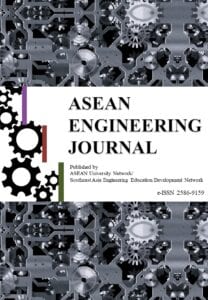COMPREHENSIVE INVESTIGATION OF PHASE FORMATION MECHANISM AND PHYSICO-MECHANICAL PROPERTIES OF Ca-Mg-SILICATE
DOI:
https://doi.org/10.11113/aej.v11.16676Keywords:
Akermanite, High-energy planetary milling, Milling speed, Phase formation mechanism, Sintering temperatureAbstract
This study aimed to investigate extensively the full phase formation mechanism from the lowest temperature to form the phases to the optimum temperature to crystallize akermanite. The effects of various milling speeds and sintering temperatures on physico-mechanical properties of akermanite prepared using high-energy planetary milling method were also investigated. The minimum formation temperature of akermanite phase (above 800°C) was determined by X-Ray diffraction (XRD) and differential thermal analysis. XRD analysis revealed akermanite had formed through gradual phase development with the increase in temperature. Below 700C, akermanite was structurally unstable while multiple transient compounds (low clinoenstatite, wollastonite, monticellite, and diopside) coexisted, as indicated by low peak intensities. Single phase akermanite was obtained by heat-treating at 1100C. Physical studies suggested the densest akermanite ceramic feature, with tensile strength range of 25.26 ± 1.41 MPa32.10 ± 2.13 MPa and Vickers microhardness range of 1.39 ± 0.04 GPa4.94 ± 0.26 GPa could be obtained at 1250°C.
















